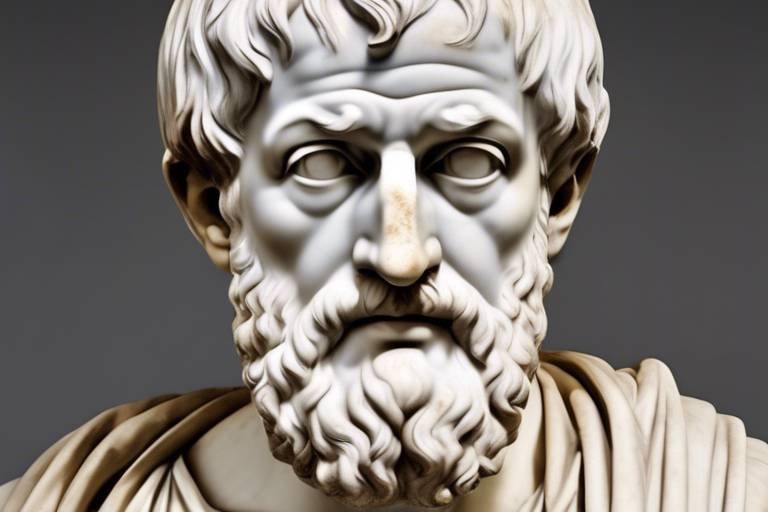Is Morality Objective or Subjective?
When we dive into the murky waters of morality, we often find ourselves grappling with a fundamental question: is morality something that exists outside of us, or is it merely a reflection of our individual or cultural beliefs? This debate has raged on for centuries, captivating philosophers, theologians, and everyday folks alike. Imagine standing at a crossroads, each path representing a different view on morality—one leading to the realm of objective truths, where right and wrong are absolute, and the other winding through the subjective landscape, where moral judgments vary from person to person and culture to culture.
To truly understand this debate, we need to explore the essence of morality itself. What do we mean when we talk about moral principles? Are they universal truths that apply to everyone, or are they shaped by the unique experiences and perspectives of individuals and societies? As we navigate through this philosophical terrain, we’ll encounter a plethora of ideas and arguments, each offering a unique lens through which to view morality.
On one hand, proponents of objective morality argue that there are moral truths that exist independently of human beliefs—think of them as the laws of nature, but for ethics. These moral truths hold regardless of what anyone thinks or feels. On the flip side, those who support subjective morality contend that our moral judgments are deeply influenced by our personal experiences, emotions, and cultural backgrounds. This perspective emphasizes the rich tapestry of human experience, suggesting that what is considered "right" or "wrong" can vary dramatically from one society to another.
As we embark on this journey, we’ll examine the philosophical foundations of both objective and subjective morality, explore historical perspectives, and engage with contemporary debates. Along the way, we’ll also address the critiques that challenge the validity of each viewpoint. By the end of our exploration, we hope to shed some light on this complex issue and perhaps even help you form your own opinion on the matter.
Understanding the essence of morality is crucial. This section delves into definitions, key concepts, and the fundamental questions that arise in the study of moral philosophy.
Objective morality posits that moral truths exist independently of human opinion. This section discusses the arguments supporting this view and its implications for ethical behavior.
This subsection covers the philosophical theories, such as moral realism, that argue for the existence of universal moral standards applicable to all individuals.
An exploration of how historical figures and cultures have approached objective morality, highlighting key thinkers and their contributions to the debate.
This section examines modern discussions and critiques of objective morality, including responses from various philosophical schools of thought.
This subsection outlines the main criticisms of objective morality, including arguments from relativism and subjectivism that challenge its validity.
Subjective morality suggests that moral judgments are based on personal or cultural beliefs. This section explores the implications of this perspective on ethical decision-making.
This subsection discusses the idea that moral values are shaped by cultural contexts, emphasizing the diversity of moral beliefs across different societies.
Examining how personal experiences and emotions influence individual moral judgments, this section highlights the subjective nature of morality in everyday life.
- What is the difference between objective and subjective morality?
Objective morality suggests that moral truths exist independently of human opinions, while subjective morality holds that moral judgments are influenced by personal or cultural beliefs. - Can moral truths change over time?
Proponents of objective morality argue that moral truths are universal and unchanging, whereas supporters of subjective morality believe that moral values can evolve based on societal changes. - Is it possible to have a universal moral code?
This is a contentious issue, with some philosophers advocating for universal moral standards, while others argue that morality is inherently tied to cultural contexts.

The Nature of Morality
Understanding the essence of morality is crucial in navigating the complex landscape of human interaction. Morality, at its core, is a system of principles that guides individuals in determining what is right or wrong. But what exactly defines these principles? Are they universal, or do they vary from one person to another, or even from one culture to another? This question is at the heart of the philosophical debate surrounding morality.
In philosophical terms, morality can be seen as a framework that helps us evaluate our actions and their consequences. It serves as a compass, guiding us through the murky waters of ethical dilemmas. But here's where it gets interesting: different cultures and societies have developed their own moral codes, which can lead to vastly different interpretations of what is considered ethical behavior. For instance, what is deemed acceptable in one culture may be frowned upon in another. This raises the question: is morality something that is inherently understood by all humans, or is it a construct shaped by societal norms and personal experiences?
To break it down further, we can categorize morality into two main perspectives: **objective morality** and **subjective morality**. Objective morality suggests that there are universal moral truths that exist independently of human beliefs. On the other hand, subjective morality posits that moral judgments are shaped by individual or cultural perspectives. This dichotomy is essential for understanding the broader implications of moral philosophy.
At the same time, we must consider the fundamental questions that arise in the study of morality:
- What constitutes a moral action?
- Are moral values innate or learned?
- How do emotions and personal experiences influence our moral judgments?
- Can moral principles evolve over time, and if so, how?
These questions not only highlight the complexity of moral philosophy but also remind us that morality is not a black-and-white issue. Instead, it exists in a spectrum of beliefs and practices that reflect the diverse experiences of humanity. As we delve deeper into the discussions of objective and subjective morality, it becomes clear that understanding the nature of morality is not just an academic exercise; it's a vital aspect of our everyday lives. The way we perceive morality influences our decisions, shapes our relationships, and ultimately defines our humanity.

Objective Morality Explained
When we talk about objective morality, we are diving into a fascinating realm where moral truths are considered to exist independently of human opinions or beliefs. Imagine a world where certain actions are universally recognized as right or wrong, regardless of individual perspectives or cultural backgrounds. This notion can be both comforting and daunting, as it suggests a moral compass that guides us all, transcending personal biases and societal norms.
Supporters of objective morality argue that there are universal moral principles that apply to everyone, akin to the laws of physics that govern the universe. Just as gravity affects us all, regardless of our beliefs about it, so too do these moral truths affect our ethical decisions. For instance, the idea that murder is wrong is a moral stance that many would argue holds true across all cultures and societies. This universality is a cornerstone of the objective morality debate, as it raises questions about accountability and moral obligation.
One of the key arguments in favor of objective morality is the concept of moral realism. This philosophical theory posits that moral statements can be objectively true or false. For example, if someone claims, "Stealing is wrong," a moral realist would argue that this statement is not just a reflection of personal opinion but rather a truth that can be assessed and validated. This perspective leads to a rich discussion about how we determine what is right or wrong and whether there are moral standards that can be universally accepted.
The philosophical underpinnings of objective morality are diverse and complex. Thinkers like Immanuel Kant have contributed significantly to this discourse with his Categorical Imperative, which suggests that we should act according to maxims that could be universally applied. This principle implies that if an action cannot be universally endorsed, then it cannot be deemed morally right. Kant’s work encourages us to consider the broader implications of our actions, pushing us to think beyond our immediate desires and to consider the impact on others.
Throughout history, various cultures and thinkers have grappled with the concept of objective morality. From the ancient Greeks, who pondered the nature of virtue, to modern philosophers who debate the existence of universal moral truths, the conversation has evolved. Figures like Aristotle emphasized the importance of virtue ethics, suggesting that moral character plays a crucial role in ethical behavior. Meanwhile, more contemporary philosophers have sought to reconcile traditional views with modern ethical dilemmas, exploring how objective morality can coexist with the complexities of human experience.
In today’s philosophical landscape, the discussion around objective morality is vibrant and contentious. Critics argue that moral truths are inherently subjective, shaped by cultural and individual perspectives. This leads to a dynamic debate between various philosophical schools of thought. For instance, proponents of utilitarianism may argue that the rightness of actions should be judged based on their outcomes, while others emphasize deontological ethics, focusing on adherence to rules and duties. These contemporary discussions highlight the ongoing struggle to define morality in a rapidly changing world.
In summary, objective morality presents a compelling framework for understanding ethical behavior. It invites us to consider whether there are inherent truths that govern our moral landscape and challenges us to reflect on our beliefs and actions. As we navigate the complexities of morality, the question remains: Are we guided by universal truths, or are we merely products of our cultural and personal experiences?
- What is the difference between objective and subjective morality? Objective morality suggests that moral truths exist independently of human beliefs, while subjective morality argues that moral judgments are shaped by personal or cultural perspectives.
- Can objective morality exist in a diverse world? Yes, proponents of objective morality believe that universal moral principles can apply to all individuals, despite cultural differences.
- What are some examples of objective moral principles? Common examples include the belief that murder is wrong and that honesty is a virtue.
- How do critics challenge objective morality? Critics argue that morality is influenced by cultural contexts and personal experiences, making it inherently subjective.

Philosophical Foundations of Objective Morality
When we dive into the philosophical foundations of objective morality, we find ourselves navigating through a rich tapestry of thought that has evolved over centuries. At its core, objective morality suggests that certain moral truths exist independently of human beliefs and feelings. Imagine for a moment a compass that always points north, regardless of where you are in the world. This is akin to the idea of objective morality, where moral principles serve as universal guides that transcend personal or cultural biases.
One of the most influential theories supporting this view is known as moral realism. Moral realists argue that moral facts are as real as physical facts. Just as we can observe the laws of physics, moral realists believe we can discover moral truths through reason and rational discourse. This leads us to an intriguing question: if moral truths are indeed universal, what implications does that have for our ethical behavior? It suggests that there are right and wrong answers to moral questions, much like there are correct answers to mathematical equations.
Throughout history, various philosophers have championed the idea of objective morality. For instance, Immanuel Kant proposed the concept of the categorical imperative, which posits that we should act only according to that maxim by which we can at the same time will that it should become a universal law. In simpler terms, Kant urged us to consider whether our actions could be applied universally without contradiction. This idea serves as a powerful foundation for objective moral standards.
Moreover, the contributions of thinkers such as John Stuart Mill and his utilitarian approach provide another layer to the discussion. While Mill's perspective is often seen as more subjective due to its focus on happiness and consequences, it nevertheless opens the door to discussions about universal well-being as a moral standard. So, while the paths may diverge, the quest for objective morality remains a common thread among many philosophical traditions.
In contemporary debates, the conversation continues to evolve. Philosophers like Peter Railton argue for a version of moral realism that incorporates scientific understanding, suggesting that our moral intuitions can be informed by empirical evidence. This modern twist on objective morality invites us to consider how our evolving understanding of human nature and society impacts our moral frameworks.
However, the discourse surrounding objective morality is not without its critiques. Detractors often point to the diversity of moral beliefs across cultures as evidence against the existence of universal moral truths. They argue that if morality were truly objective, we would expect a greater degree of consensus among different societies. This brings us to a fascinating crossroads: can we reconcile the apparent plurality of moral beliefs with the possibility of objective moral truths? It's a question that continues to spark debate among philosophers and ethicists alike.
Ultimately, the philosophical foundations of objective morality challenge us to reflect deeply on the nature of right and wrong. They push us to consider whether our moral intuitions are merely subjective or if they can be anchored in something more substantial. As we explore these ideas, we are invited to engage in a broader dialogue about what it means to live a moral life in an increasingly complex world.

Historical Perspectives
The exploration of objective morality isn't just a modern philosophical endeavor; it stretches back through the annals of history, shaped by the thoughts and teachings of various influential figures. Thinkers like Plato, Aristotle, and Kant have laid the groundwork for understanding morality as something that transcends individual belief systems. For instance, Plato argued for the existence of an ideal realm of forms, where the essence of goodness resides, suggesting that moral truths are universal and immutable, much like mathematical truths.
In contrast, Aristotle introduced a more practical approach, emphasizing virtue ethics. He believed that achieving moral excellence is about finding a balance and cultivating virtues that lead to a good life. This idea aligns with the notion of objective morality, as it implies that there are certain characteristics that define a virtuous person, regardless of societal norms. Aristotle's teachings have been influential in shaping moral philosophy, particularly in the Western tradition.
Moving forward in time, we encounter Immanuel Kant, who is often regarded as a champion of objective morality through his concept of the Categorical Imperative. Kant argued that moral actions must be universally applicable, meaning that if one believes an action is right, it should be right for everyone in similar circumstances. This idea sets a standard for ethical behavior that is not swayed by personal feelings or cultural differences, asserting that morality is grounded in rationality and duty.
However, the historical perspective on morality is not solely dominated by Western philosophers. In Eastern traditions, such as Confucianism and Buddhism, there are also elements that reflect a quest for universal moral principles. Confucius emphasized the importance of social harmony and the role of virtues in achieving a balanced society, while Buddhism advocates for compassion and mindfulness as universal moral tenets.
Throughout history, various cultures have grappled with the concept of objective morality, often debating its existence in the face of differing beliefs and practices. In ancient societies, moral codes were often intertwined with religious doctrines, which provided a framework for understanding right and wrong. For example, the Ten Commandments in Judeo-Christian traditions serve as a moral compass believed to be divinely ordained.
As we progressed into the Enlightenment, thinkers began to challenge the status quo, questioning whether moral truths could exist independently of religious or cultural contexts. This led to a rich tapestry of debates that laid the foundation for contemporary discussions on morality. The clash between objective and subjective morality continues to resonate today, as modern philosophers and ethicists seek to navigate the complexities of moral principles in an increasingly pluralistic world.
In summary, the historical perspectives on objective morality reveal a diverse array of thoughts and theories. From the idealism of Plato to the rationalism of Kant, each philosopher contributed to the evolving understanding of morality as a potential universal standard. Yet, the dialogue remains open, with ongoing debates reflecting the intricate relationship between culture, belief, and moral truth.
- What is the difference between objective and subjective morality? Objective morality posits that moral truths exist independently of human beliefs, while subjective morality suggests that moral judgments are shaped by personal or cultural perspectives.
- Can objective morality exist without a religious framework? Yes, many philosophers argue for objective moral standards based on reason and rationality, independent of religious beliefs.
- How do cultural differences impact moral beliefs? Cultural relativism highlights that moral values can vary significantly across different societies, influencing how individuals perceive right and wrong.
- What role do emotions play in subjective morality? Emotions can heavily influence individual moral judgments, as personal experiences often shape how one perceives ethical dilemmas.

Contemporary Debates
The discussion surrounding objective morality in contemporary philosophy is nothing short of vibrant and dynamic. In recent years, scholars have engaged in heated debates about whether moral truths can genuinely exist outside of human perception. This question is not merely academic; it resonates deeply with our everyday lives, influencing everything from legal standards to personal ethics. One of the most significant aspects of these contemporary debates is the emergence of new perspectives that challenge traditional notions of morality.
For instance, many modern philosophers argue that the rise of global communication and multicultural interactions has brought forth a more nuanced understanding of morality. They posit that as we encounter diverse moral frameworks, it becomes increasingly difficult to claim that any one set of moral principles is universally applicable. This perspective raises fascinating questions: Are we witnessing the erosion of objective morality, or is it evolving into a more inclusive form that accommodates various cultural values?
Moreover, the advent of technology has introduced new ethical dilemmas that were previously unimaginable. Consider the implications of artificial intelligence and machine learning on moral decision-making. As we delegate more responsibilities to machines, the question arises: Can these systems possess moral understanding, or are they simply following programmed algorithms? This dilemma has sparked debates among ethicists, technologists, and policymakers alike, leading to a re-evaluation of what it means to act morally in a rapidly changing world.
In addition, the rise of social movements advocating for human rights and environmental justice has prompted a reevaluation of moral standards. Activists argue that certain moral truths—such as the rights of marginalized groups or the ethical treatment of our planet—should be recognized universally, regardless of cultural context. This assertion challenges the idea of subjective morality, suggesting that there may be some moral principles that transcend individual beliefs. Yet, critics of this view argue that imposing these standards can lead to cultural imperialism, where one culture's values are imposed on another.
As we navigate these complex issues, it's essential to recognize that contemporary debates about morality are not simply black and white. They encompass a spectrum of beliefs and arguments, each contributing to our understanding of what it means to be moral in today's world. The tension between objective and subjective morality remains a central theme, prompting ongoing discussions that are as relevant now as they have ever been.
- What is objective morality? Objective morality refers to the belief that certain moral truths exist independently of human opinions and are universally applicable.
- What is subjective morality? Subjective morality suggests that moral judgments are shaped by personal or cultural beliefs, making them unique to each individual or society.
- How do contemporary debates influence our understanding of morality? These debates challenge traditional views and encourage a more inclusive understanding of morality, considering diverse cultural perspectives and modern ethical dilemmas.

Critiques of Objective Morality
The debate surrounding objective morality is not without its critics. Many philosophers argue that the notion of universal moral truths is fundamentally flawed. One of the primary critiques comes from moral relativism, which posits that moral judgments are not absolute but instead vary across different cultures and societies. This perspective challenges the idea that there are fixed moral standards applicable to all humans, suggesting instead that what is considered "right" or "wrong" can differ dramatically based on cultural context.
Furthermore, critics argue that objective morality fails to account for the diversity of human experiences and the complexities of individual circumstances. For instance, consider a moral dilemma where two individuals face vastly different life experiences. If one person has grown up in a culture that values community over individuality, while another has been raised in a society that prioritizes personal freedom, their moral decisions may diverge significantly. This raises the question: can there truly be a one-size-fits-all moral standard when human experiences are so varied?
Another significant critique is rooted in subjectivism, which asserts that moral judgments are inherently personal. According to subjectivists, morality is shaped by individual emotions, preferences, and personal beliefs. This perspective suggests that when someone proclaims an action to be "wrong," it often reflects their personal feelings rather than an objective truth. For example, if one person feels that lying is morally unacceptable due to their values, while another believes that lying can be justified in certain situations, who is to say which view is correct? This subjective lens complicates the idea of objective morality, as it implies that moral truths may not exist independently of human opinion.
Moreover, the historical application of objective morality raises further questions. Throughout history, various societies have claimed to uphold objective moral truths, yet these truths have often been used to justify actions that many today would consider unethical, such as colonialism or slavery. This inconsistency suggests that what is often labeled as "objective" is, in reality, influenced by the prevailing social and political climates of the time. As a result, critics argue that the concept of objective morality can lead to dogmatism, where individuals rigidly adhere to perceived moral truths without considering the nuances of specific situations.
In response to these critiques, proponents of objective morality often cite the existence of certain moral intuitions that seem to be universally recognized, such as the wrongness of murder or torture. They argue that these shared moral beliefs indicate the presence of objective moral truths. However, critics counter that even these intuitions can be influenced by cultural narratives and societal norms, further blurring the lines between objective and subjective morality.
Ultimately, the critiques of objective morality highlight a fundamental tension in moral philosophy: the struggle between the desire for universal moral standards and the recognition of individual and cultural differences. As we navigate this complex landscape, it becomes increasingly clear that the conversation surrounding morality is far from settled. It invites us to examine our own beliefs and consider how they are shaped by our backgrounds, experiences, and the societies in which we live.
- What is objective morality? Objective morality refers to the belief that certain moral principles are universally valid and independent of individual opinions.
- What is subjective morality? Subjective morality suggests that moral judgments are shaped by personal beliefs and cultural contexts, meaning they can vary significantly between individuals and societies.
- How do cultural differences affect morality? Cultural differences can lead to varying moral beliefs and practices, challenging the notion of universal moral standards.
- Can objective morality coexist with subjective morality? Some philosophers argue that while there may be objective moral truths, our understanding and application of these truths are often influenced by subjective experiences.

Subjective Morality Explained
When we dive into the realm of subjective morality, we find ourselves in a landscape where moral judgments are not absolute but rather influenced by personal beliefs, emotions, and cultural contexts. Imagine morality as a colorful tapestry woven from the threads of individual experiences and societal norms. Each person's perspective contributes to this intricate design, making it unique and diverse. This subjective view challenges the idea that there is a universal moral code that everyone should follow.
At the heart of subjective morality is the notion that what is considered "right" or "wrong" can vary significantly from one person to another. For instance, think about the differing attitudes toward issues like abortion or capital punishment. In some cultures, these practices are viewed as morally acceptable, while in others, they are seen as abhorrent. This diversity illustrates how morality can be shaped by a multitude of factors, including historical context, religious beliefs, and personal experiences.
Moreover, subjective morality emphasizes the role of individual feelings in making ethical decisions. Have you ever made a choice based on your gut feeling? That instinctive reaction often stems from your moral compass, which is uniquely yours. It’s like navigating through a foggy landscape; your experiences and emotions act as your guiding lights, helping you determine the right path. This perspective suggests that moral judgments are not only shaped by cultural influences but also by our personal journeys.
One of the intriguing aspects of subjective morality is cultural relativism. This idea posits that moral values are not universal but instead are shaped by the cultural contexts in which they arise. For example, consider the practice of arranged marriages, which might be viewed positively in some cultures as a way to strengthen familial ties, while in others, it might be seen as restrictive to individual freedom. This cultural lens highlights how morality can be fluid and adaptable, reflecting the values and beliefs of a particular society.
To further illustrate the concept of subjective morality, let’s look at a few key points:
- Personal Experiences: Each individual’s life experiences shape their moral beliefs, leading to a range of perspectives on ethical issues.
- Emotional Influence: Feelings play a crucial role in moral decision-making, often guiding individuals toward what they perceive as right or wrong.
- Cultural Context: Different societies have varying moral codes based on their traditions, histories, and social norms.
In essence, subjective morality invites us to embrace the complexity of human experience. It encourages open dialogue and understanding among individuals with differing moral beliefs. Just as no two fingerprints are alike, no two moral perspectives are identical. This diversity enriches our conversations about ethics and challenges us to consider viewpoints beyond our own.
As we explore the implications of subjective morality, it's clear that it plays a significant role in shaping our ethical landscapes. It compels us to ask ourselves: How do our backgrounds and experiences influence our moral judgments? By reflecting on these questions, we can develop a deeper understanding of not just our own beliefs but also the beliefs of others, fostering a more compassionate and inclusive society.
1. What is subjective morality?
Subjective morality refers to the idea that moral judgments are shaped by personal beliefs and cultural contexts, rather than being universally applicable.
2. How does cultural relativism relate to subjective morality?
Cultural relativism is a key component of subjective morality, suggesting that moral values vary between cultures and are influenced by societal norms.
3. Can subjective morality lead to moral chaos?
While subjective morality allows for diverse perspectives, it can also lead to conflicts. However, it encourages dialogue and understanding, helping to bridge differences.
4. How do personal experiences influence moral judgments?
Personal experiences shape individuals' beliefs and values, leading to unique moral perspectives that can differ widely from one person to another.

Cultural Relativism
Cultural relativism is a fascinating concept that posits that moral values and ethical standards are not universal but instead shaped by cultural contexts. Imagine walking into a bustling marketplace in a foreign country where the customs and traditions are vastly different from your own. What might seem strange or even wrong to you could be perfectly acceptable to the locals. This highlights the essence of cultural relativism: morality is deeply intertwined with the cultural fabric of society.
At its core, cultural relativism challenges the notion of a single, objective morality that applies to all humanity. Instead, it suggests that moral judgments are influenced by the specific circumstances, beliefs, and practices of different cultures. For instance, consider the varying views on issues such as marriage, gender roles, and dietary restrictions. In some cultures, arranged marriages are the norm and are viewed as a positive tradition, while in others, individual choice is paramount. This divergence raises the question: can we truly judge another culture's practices through the lens of our own moral beliefs?
One of the key implications of cultural relativism is that it fosters a sense of tolerance and understanding towards different ways of life. By recognizing that our moral frameworks are shaped by our upbringing and environment, we can appreciate the diversity of human experience. However, this perspective is not without its challenges. Critics argue that if morality is entirely subjective, it becomes difficult to condemn practices that might be harmful or unjust, such as human rights abuses or discrimination.
To further illustrate cultural relativism, consider the following examples:
- Marriage Practices: In some cultures, polygamy is accepted and even celebrated, while in others, monogamy is the standard.
- Gender Roles: Certain societies may have strict gender roles that dictate the behavior and responsibilities of men and women, which can be viewed as oppressive by outsiders.
- Dietary Laws: Religious beliefs can dictate what is considered acceptable to eat, leading to varied dietary practices across cultures.
Ultimately, cultural relativism invites us to reflect on our own moral beliefs and consider how they are shaped by our cultural context. It encourages open dialogue and respect for different perspectives, but it also challenges us to think critically about the implications of accepting all cultural practices as equally valid. As we navigate this complex landscape, we must balance respect for cultural diversity with the pursuit of universal human rights and ethical standards.
- What is cultural relativism?
Cultural relativism is the idea that moral values and ethical standards are shaped by cultural contexts and vary across different societies. - How does cultural relativism affect our understanding of morality?
It encourages us to see morality as subjective and influenced by cultural norms, promoting tolerance and understanding of diverse practices. - Can cultural relativism justify harmful practices?
Critics argue that it can make it challenging to condemn practices that violate human rights, as it suggests all cultural norms are equally valid. - How can we navigate cultural differences in morality?
By fostering dialogue, respect, and critical thinking about our own beliefs while remaining open to understanding others.

Individual Moral Perspectives
When we think about morality, it’s easy to assume there’s a universal code that everyone should follow. But let’s face it—moral judgments are often as varied as the individuals who make them. Individual moral perspectives are shaped by a multitude of factors, including personal experiences, emotions, upbringing, and even the cultural context in which one lives. Have you ever noticed how two people can witness the same event and come away with completely different interpretations of what was right or wrong? This is the essence of subjective morality—a fascinating and complex tapestry woven from the threads of our unique lives.
Consider this: your moral compass is influenced by your childhood experiences. If you grew up in a household that emphasized honesty and integrity, you might find yourself prioritizing these values in your adult life. On the other hand, someone raised in an environment where survival often meant bending the truth might have a different outlook. This doesn’t make one perspective more valid than the other; it simply highlights how our backgrounds shape our moral judgments.
Moreover, emotions play a significant role in how we assess right and wrong. When faced with moral dilemmas, our feelings can cloud our judgment or illuminate the path we choose. For example, if a friend is in distress and asks for help, your immediate emotional response might drive you to assist them, even if it means compromising your own values. This emotional tug-of-war can lead to moral decisions that reflect our individual experiences rather than any universal standard.
It’s also important to recognize that moral perspectives can evolve over time. As we encounter new ideas and experiences, our understanding of morality can shift. This fluidity is particularly evident in today's globalized world, where exposure to diverse cultures and beliefs challenges our preconceived notions. For instance, you may have grown up believing that certain behaviors are unacceptable, but after engaging with different cultures, you might begin to see those behaviors in a new light. This evolution of thought underscores the subjective nature of morality and how it can be influenced by broader societal changes.
In essence, individual moral perspectives remind us that morality is not a one-size-fits-all concept. It is a deeply personal journey shaped by a myriad of influences. Just as we each have our unique fingerprints, our moral beliefs are distinct and can often lead to rich discussions about what it means to be ethical in a complex world. So, the next time you find yourself in a moral debate, remember that the other person’s perspective is just as valid as your own, shaped by their own life experiences and beliefs.
- What factors influence individual moral perspectives? Individual moral perspectives can be influenced by personal experiences, emotions, cultural background, and societal norms.
- Can moral perspectives change over time? Yes, as individuals encounter new experiences and ideas, their moral perspectives can evolve and adapt.
- Is one moral perspective more valid than another? No, moral perspectives are subjective and shaped by individual experiences, making them equally valid in their own context.
Frequently Asked Questions
- What is the difference between objective and subjective morality?
Objective morality suggests that moral truths exist independently of human opinions, meaning there are universal standards of right and wrong that apply to everyone. On the other hand, subjective morality argues that moral judgments are shaped by personal beliefs and cultural contexts, leading to varying interpretations of what is considered moral across different societies.
- Can objective morality be proven?
Proponents of objective morality often reference philosophical theories like moral realism, which argue that moral truths can be discovered through reason and ethical inquiry. However, critics argue that these truths are often influenced by cultural and individual perspectives, making it difficult to establish a universally accepted moral framework.
- How does cultural relativism relate to subjective morality?
Cultural relativism is a key concept within subjective morality, emphasizing that moral values are shaped by cultural contexts. This means that what is deemed right or wrong can vary significantly between cultures, highlighting the importance of understanding and respecting diverse moral beliefs.
- Are there any universal moral principles?
While some philosophers argue for the existence of universal moral principles, others contend that morality is too complex and influenced by various factors to be universally applicable. The debate continues, with both sides presenting compelling arguments about the nature of morality.
- How do personal experiences influence moral judgments?
Individual experiences play a significant role in shaping one’s moral perspective. Emotions, upbringing, and personal encounters can greatly affect how we perceive right and wrong, illustrating the subjective nature of morality in our everyday lives.
- What are the implications of believing in subjective morality?
Believing in subjective morality can lead to a more open-minded approach to ethical discussions. It encourages individuals to consider multiple viewpoints and recognize that different cultures and individuals may have valid reasons for their moral beliefs, fostering dialogue and understanding.
- How can we reconcile differences in moral beliefs?
Reconciling differences in moral beliefs often requires open communication and a willingness to understand other perspectives. Engaging in respectful discussions and seeking common ground can help bridge the gaps between differing moral viewpoints.



















